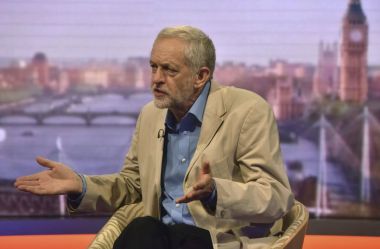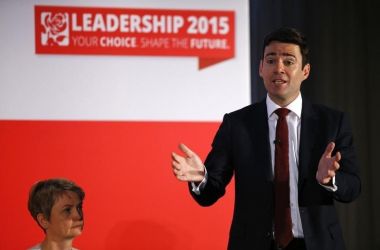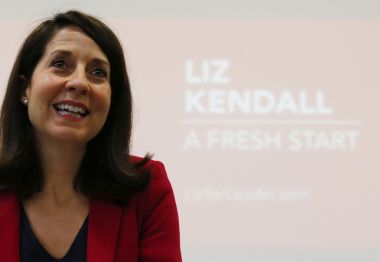The vital ingredient missing from the Labour Leadership election...

Jeremy Corbyn looks on course to become the leader of the Labour Party. This turn of events, which professional political pundits thought impossible only a couple of short months ago is close to becoming reality.
Throughout its history, the Labour Party has been made up of three different factions. Today, only two of them are represented in the leadership election, and it's the absence of the third which goes a long way to explaining why the Islington North MP is confounding expectations and leaving his more fancied opponents struggling for second place. So who are the three factions we're talking about?
1) The Labour Right
Who's this? Someone who's interested in equality, but wants to remain resolutely pro-business and is wary of the influence of Marxism. A Social Democrat more than a Socialist.
The Labour Right incorporates influential post-war figures such as Hugh Gaitskill and Tony Crosland. Roy Jenkins, David Owen and Shirley Williams were broadly from this tradition and when Labour took a leftward turn under Michael Foot in the 80s, they left to form the SDP, which has since mutated into the Liberal Democrats. The Labour Right began to reassert itself under Neil Kinnock and has been in the ascendency since Tony Blair took charge in 1994.
2) The Labour Left
Who's this? This Labour member has a more class-based view of the world. Not necessarily a Marxist but someone who's deeply sceptical about capitalism. Committed to public ownership of utilities and a significant role for the State.
Early on, Communist groups and radical Trade Unions were part of the emerging coalition which created the Labour movement. In the 80s the Trotskyite Militant Tendency was ejected from the Party but some whose influence owes more to Marx than Methodism have retained their links to the party. More broadly speaking, Labour has contained within it many supporters of a democratic socialism which prioritises "the common ownership of the means of production, distribution and exchange" in the words of the old Clause 4. From the father of the NHS, Aneurin Bevan, to Tony Benn, the left of the Party has its own totemic figures.
3) Christian Socialists
Who's this? Not simply a Christian who happens to be a Labour member – but someone whose political philosophy is strongly influenced by the Gospels, by Catholic Social Teaching, and the Christian Socialist tradition.
Harold Wilson once famously said that British socialism "owed far more to Methodism than to Marx." He was right. A brief glance at the history of the Labour Party (and indeed, the wider Left) will reveal that Christians and churches haven't just been an incidental part of the story. They've been integral.
Starting with the the earliest modern dissenters, you can trace the thread of radical Christian political thought through the Levellers to the Tolpuddle Martyrs and the Chartists. In the 19th Century when socialism became a coherent movement and left and right emerged as political signifiers, Christians were key.
Anglican theologian FD Maurice was one of the founding fathers of what became Christian Socialism. From its formation in 1900, the Labour Party drew on the support of churches and Christians – non-conformists became especially influential. The party's first leader and one of the towering figures of the British Left, Keir Hardie, was a lay preacher in the Evangelical Union and described as "the 'prophet and evangelist' of the Labour Party". Other early Labour leaders such as Arthur Henderson (Methodist lay preacher) and George Lansbury (Church Socialist League) were committed Christian socialists.
This contribution by Christians to the Labour Party (along with significant Christian presence in the Conservative Party and the Liberal Party) meant that unlike many continental European countries, a specifically Christian Democratic political party has never emerged – and neither has a more hard left party ever been near power.
However, in the aftermath of the Second World War and the radical reforms of the Attlee government, Christian Socialism (despite its ongoing presence via the likes of RH Tawney and Donald Soper) was reducing in influence in the Labour Party. The other two main streams of influence in the Labour Party – broadly speaking, the Right and the Left – continued to wield their influence.
The modern face of the Labour Party?

Understanding these three groupings is the key to why many of us feel a sense of hollowness at the current leadership election. There are three factions within the Labour camp – but the leadership campaign only has two represented. Frontrunner Corbyn represents the Left – he's anti-austerity, has opposed various foreign interventions and fundamentally believes in a large role for public ownership of public services. The other three candidates are essentially different flavours of Labour Right. While Andy Burnham and Yvette Cooper both served under Tony Blair and Gordon Brown, Liz Kendall is probably the most obviously Blairite candidate. But Cooper and Burnham's positions do seem to fit comfortably within the traditional Labour Right. So the one grouping that is without a representative in this campaign is the Christian Socialist camp.
It's hard to pin down exactly why there isn't a strong contingent of Christian Socialists in the Labour hierarchy. Many would point to the untimely death of Labour leader John Smith, a committed Christian Socialist whose heart attack in 1994 robbed the country of one of its most-loved politicians.

Seeking the profound hope epitomised by the likes of Hardie and Lansbury, many Christian Socialists have been drawn to the Blue Labour project – which aims to find a radical third way between the big state socialism of the Left and the pro-Market policies of the Right. Blue Labour has drawn on Catholic Social Teaching as well as the Christian Socialist tradition of the Labour Party. It suggests that in advocating 'top down' solutions Labour (both Left and Right) has become too managerial and not relational. Blue Labour says that values which have been important to many British people – such as their faith, their family and even pride in their country – have been eroded by decades of 'metropolitan progressives' being in charge. Blue Labour wants power to be redistributed from the over-powerful State and the over-powerful Market to local communities. Those Parliamentarians who've supported some aspects of Blue Labour have tended to be Christians, such as John Cruddas, Frank Field and David Lammy (although Christians have been among its critics too).
There is no Blue Labour candidate in the leadership election. Kendall has made encouraging noises about redistributing power, while Corbyn's vision for a publicly owned but co-operatively run railway looks promising. Cooper says she supports, "Christian socialism but without the God attached," while Burnham retains some his links with his Catholic upbringing. But in reality none of the candidates ticks enough boxes to appear to be doing much more than paying lip service to the ideas of Christian Socialism or Blue Labour.

This means that those Labour MPs who are Christians (and see themselves in the Christian Socialist tradition) have spread their support around the candidates. And herein lies the problem. While there is no Christian Socialist candidate – the only radical alternative to a stale continuity of the last 20 years of Blairism/Brownism/Milibandism is the offer being made by Jeremy Corbyn. For many of us, Blairism is a busted flush – its pandering to the Market exposed horribly by the gargantuan financial meltdown of 2007-8; its extreme social and economic liberalism typified by 24-hour drinking and the proliferation of betting shops; its calamitous decision to invade Iraq – the consequences of which continue to be reaped by the Iraqi people.
Corbyn doesn't offer a coherent solution to this malaise. But he does speak plainly, has a consistent left-wing vision for the future and is inspiring younger people in a way that the other candidates can only dream of. This clip from a debate on LBC crystallises exactly why Corbyn is popular – he gives a straight answer! You may not agree with what he says, but you at least understand it. The Labour Right under Blair and Brown became so obsessed with keeping the Daily Mail and the Murdoch press onside that they became paranoid about saying or doing anything which would see them painted as 'loony lefties.' Yet Rupert Murdoch himself now says what many are thinking: the three Labour Right candidates haven't got a clear agenda, a coherent plan or indeed the ability to inspire Labour voters – let alone the huge swathes of the electorate Labour needs to win back.
Corbyn increasingly likely Labor winner. Seems only candidate who believes anything, right or wrong.
— Rupert Murdoch (@rupertmurdoch) August 20, 2015So Corbyn is cashing in. Labour members, many of whom seem fed up of pounding the streets to sell a vision which is 'a bit less right-wing that the Conservatives' are being attracted in droves. Then there are the new members and supporters who have joined in large numbers to vote for Corbyn. This phenomenon shows a similar energy to the wave of support garnered by Syriza in Greece or Podemos in Spain. But if the Labour Right's vision is stale and timid, the Labour Left's vision remains overly focused on material issues. Only the Christian Socialist viewpoint extolls the Common Good.
Some of Corbyn's economic policies are attractive (and have the support of mainstream economists) and certainly his opposition to the Iraq war will tick the box for many. But radicalism isn't an answer in itself. The sort of radicalism we're missing is the sort of radicalism exemplified by the Christian Socialist tradition.
It's the radicalism of George Lansbury, who led the extraordinary Poplar Rates Rebellion of 1921 – finding himself and his fellow Labour Councillors imprisoned for standing up for the poor of his borough.
It's the radicalism of RH Tawney in his masterful works, "The Acquisitive Society," "Equality," and "Religion and the Rise of Capitalism" in which he advocated for an ethical socialism – participation by communities in their governance, rather than merely the dead hand of the State or the Market.
It's a radicalism which seems ripe for a comeback in an age when the Department for Work and Pensions is caught fabricating testimonies to justify benefit sanctions, when the UK has such an astonishing level of inequality, and when a Christian Charity says the UK has some of the unhappiest children in the world.
But it's a radicalism which remains largely voiceless in the contemporary debate, despite the great efforts of Christians on the Left to revive the Christian Socialist Tradition within the Party and the Blue Labour Movement to extol that radical third way between the Market fundamentalism of the Conservatives and the managerial tendencies of both the Labour Left and Right.
This is about more than whether Labour can, or indeed deserves to, win the next General election. It's about the future of the country. As theologian Luke Bretherton has brilliantly articulated, a Labour Party without Christian Socialism is a Party without a soul. John Cruddas says we have a choice between rationalism and romanticism – and rationalism has run its course.
Whoever wins the leadership (and deputy leadership and London mayoral elections) it's incumbent on Christians to learn our history. The great and proud tradition of Christian Socialism rests upon the shoulders of non-conformists such as Hardie and Lansbury, but today it can be informed by a renewed interest in the exciting vision of Catholic Social Teaching. Beyond learning the history and hoping for a better future for Christian Socialism, we must get involved.
In his recent book the director of Christians on the Left, Andy Flannagan, urged us to Show Up. Now, more than ever, that's a call we should heed. Our voice is needed. And it might just be radical enough to change the Labour Party, and the country.











